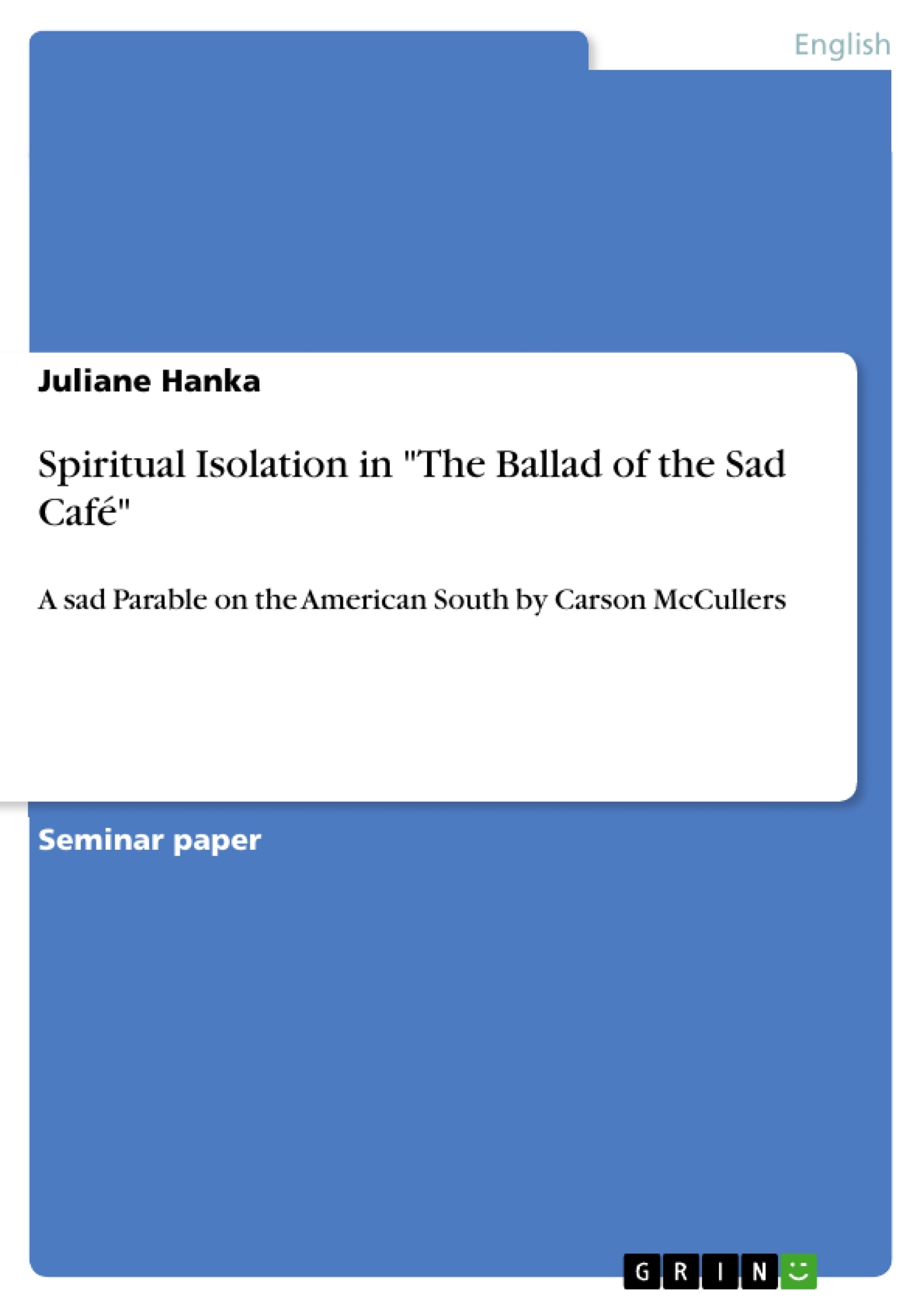This paper is going to examine how the southern-born writer Carson McCullers creates the lonely picture of an individual living in hopeless spiritual isolation in a southern town. The South used to be a rural area with its own distinctive culture and a “strong folk tradition, preserved mainly through music and language” (Forkner 91). It will be discussed how this image had to give way to the new reality of the South by the time of the 1940s. It had turned into an interchangeable urbanized society which excluded the individual which did not correspond to southern norms. Furthermore, by analyzing the main characters of The Ballad of the Sad Café, the paper points out the unique dreariness of McCullers’ visions, looking for reasons in her childhood as well as in her adult life. Focusing on her work The Ballad of the Sad Café, the paper underlines that McCullers was always questioning the national identity of 20th century America in general, and the transforming southern society in particular. Further on, it discusses the crucial difference between Carson McCullers’ and William Faulkner, who is known as the most recognized writer of her time. By interpreting the novelette The Ballad of the Sad Café, the paper is going to highlight the topic McCullers was most concerned about: The spiritual isolation of the individual. An isolation which is deeply rooted within a person who does not fit into the narrow-minded and prefabricated picture of the stereotypical southern society. Finally, my paper emphasizes Carson McCullers’ concern with gender and behavioral concepts in the early 20th century, which she turned upside down in order to uncover the artificiality of the southern myth and its rigid moral conceptions.
Table of Contents
- Introduction
- The South
- The Dichotomy of Myth and Reality
- Carson McCullers and the Southern Myth
- Carson McCullers and William Faulkner
- The Spiritual Isolation of Carson McCullers
- The Spiritual Isolation in The Ballad of the Sad Café
- Brief Summary of the Plot
- The Spiritual Isolation of the Lover and the Beloved
- Miss Amelia's Suspension of Spiritual Isolation
- The Spiritual Isolation of \"The Twelve Mortal Men\"
- Spiritual Isolation as Social Criticism
- The Rise and Fall of the Café
- Gender Transgression as Social Criticism
- Conclusion
Objectives and Key Themes
This paper delves into the portrayal of spiritual isolation in the American South, specifically focusing on the work of Carson McCullers and her novelette, The Ballad of the Sad Café. The paper aims to examine how McCullers captures the loneliness of an individual trapped in a southern town marked by the clash of traditional values and the modernizing reality of the South. It explores the specific context of the South in the 1940s, where a traditional, idealized image of the South collided with the urbanization and social changes taking place.
- The Dichotomy of Myth and Reality in the American South
- The Impact of Social Change on Traditional Southern Values
- The Theme of Spiritual Isolation in the Work of Carson McCullers
- The Use of Symbolic Language and Characters to Explore Social and Gender Norms
- The Distinction between Carson McCullers and William Faulkner's Portrayals of the South
Chapter Summaries
The first chapter provides an introduction to the paper's focus on Carson McCullers' portrayal of spiritual isolation in the South. Chapter 2 delves into the complex relationship between the mythical image of the South and the rapidly changing reality of the region during the 1940s. It analyzes how the South, burdened by traditional values and idealized stereotypes, struggled to adapt to modern urbanization and social transformation.
Chapter 3 explores the central theme of spiritual isolation in McCullers' work, linking it to her personal experiences and the social and cultural context of the time. Chapter 4 focuses on the main characters of The Ballad of the Sad Café and examines how they embody the themes of love, loneliness, and isolation within the context of the southern town. It also explores the symbolic meaning of the café itself and its significance in representing the changing landscape of the South.
Chapter 5 examines how McCullers uses the café as a metaphor for the rise and fall of the old South, highlighting how it represents the social and economic changes of the time. It also explores the ways in which McCullers challenges traditional gender norms and expectations through the portrayal of her characters and their unconventional relationships. The final chapter, which is excluded from this preview, will offer a concluding reflection on the overall significance of the themes explored in the preceding chapters.
Keywords
This preview highlights the key concepts of spiritual isolation, southern identity, gender transgression, traditional values, social change, and the dichotomy of myth and reality. It explores these themes through an analysis of Carson McCullers' work, particularly The Ballad of the Sad Café. The paper investigates the influence of the historical and social context of the American South on McCullers' writing and emphasizes the symbolic significance of her characters and narrative elements in reflecting the broader societal and cultural shifts of the 20th century.
- Quote paper
- Juliane Hanka (Author), 2006, Spiritual Isolation in "The Ballad of the Sad Café", Munich, GRIN Verlag, https://www.grin.com/document/62395




